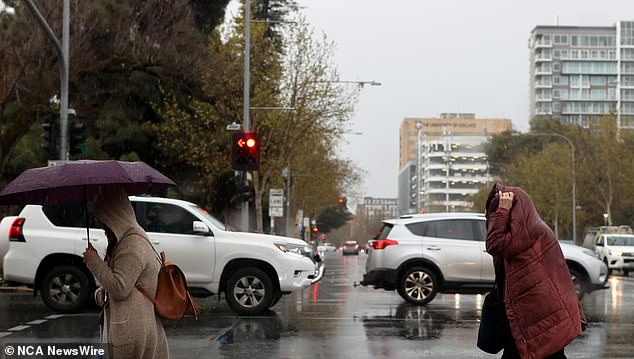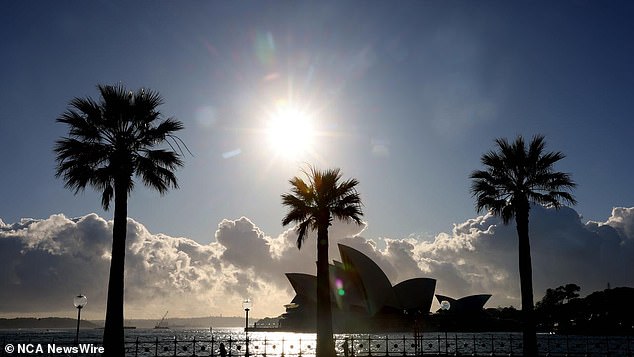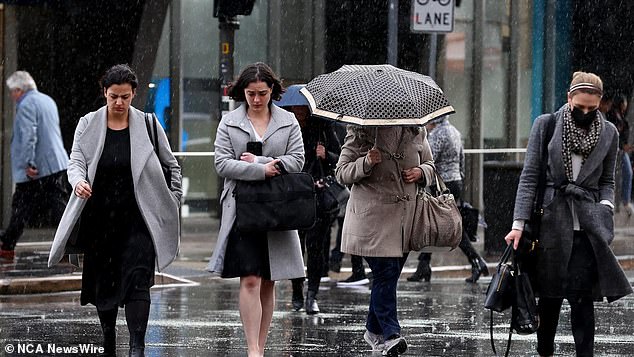After the coldest July in years in Australia, the last month of winter in August will bring warmer temperatures and above-average rainfall.
There was one exception to this chilly July, though: while the rest of the country was firing up the heaters, Perth had its warmest July in three years – but it’s set to rain cats and dogs this weekend.
Melbourne was the complete opposite of the Western Australian capital, enduring its coldest July in nine years.
But the worst of the cold may be over this year in Melbourne and elsewhere, with warmer than usual temperatures forecast across much of the country in the coming weeks.
In fact, large areas of Australia are expected to see temperatures 70 to 80 percent above the average nighttime minimum temperature for the month.
Daytime temperatures are also forecast to be above average in August, especially in northern, eastern and southeastern Australia.
However, Perth’s lucky streak may be about to end as temperatures will be closer to average across Western Australia and the centre of the country.
The Bureau of Meteorology (BoM) has also warned WA residents to prepare for “unseasonable” rainfall in the coming days.
After the coldest July in years in Australia, August, the last month of winter, will bring above-average rainfall.
“It’s not very typical for this time of year to see rain, it’s normally the dry season,” said senior meteorologist Jonathan How.
The system is forecast to move eastwards towards central Australia over the weekend, bringing heavier rainfall to parts of the southern Northern Territory and northern South Australia.
BoM forecaster Angus Hines earlier said showers would be widespread, with some areas seeing 20, 30 or 40mm of rain.
“When that amount of rain falls in normally dry areas of central Australia, it can certainly have some impact, particularly on travel and transport,” he said.
‘A lot of these inland roads in these parts of the country are dirt roads, so it doesn’t take much wet weather for them to become muddy and in some cases impassable.
We could see road closures over the weekend, but there is still a bit of uncertainty, there is not complete clarity as to how this will play out.
“But we expect to see rain in this part of the country on Saturday and particularly on Sunday.”
The rain is expected to intensify as it moves eastwards across central Australia over the weekend, and potentially strengthen when it reaches the eastern states next week.
Although warmer weather is on the way, temperatures dropped to -8°C across Australia early Saturday.
“We had another cold start this morning, particularly in eastern Australia,” Hines said.

Adelaide (pictured) is expected to see a high of 16C with some sunshine on Saturday, while Sunday is forecast to see a high of 17C but with a chance of showers.
Canberra dipped to -5.6C, while Cooma in the Snowy Mountains dropped to -8.4C, knocking it off the list as the coldest place in the country on Saturday morning.
“We’ve seen very cold temperatures across northern New South Wales and south-east Queensland again this morning, and we’ve seen some fog around the Adelaide metro,” How said.
‘Overall quite cold… a continuation of what we’ve seen during the week with those cold mornings.
‘The good thing about today’s cold mornings is that there are sunny days.’
Much of New South Wales, Queensland, northern Victoria and Canberra will see sunny skies on Saturday.
“For the rest of the weekend, we’re expecting fairly stable conditions across Queensland, New South Wales, Victoria and Tasmania,” How said.
‘A high pressure system over Australia is bringing fairly calm and dry conditions – plenty of sunshine if you live on the coast, so it’s a good day to get out.’
Sydney is expected to have a mostly sunny weekend with a high of 19°C on Saturday and Sunday.
Melbourne is expected to be partly cloudy with a chance of showers, with a high of 15 over the weekend.
Brisbane will also see some sunshine with a high of 23°C and light winds.
Perth will be mostly sunny with a high of 19°C and some light winds are also expected.

Sydney (pictured) is expected to have a mostly sunny weekend with a high of 19°C on Saturday and Sunday.
Adelaide is expected to reach a high of 16°C with some sunshine on Saturday, while Sunday is forecast to reach 17°C with a chance of showers.
Hobart is expected to see a chance of showers over the weekend and a high of 14°C, while Canberra is also expected to see sunshine and a high of 14°C.
The minimum temperature in the NT is expected to drop to -3°C on Sunday.
Darwin is expected to be mostly sunny with a high of 32°C this weekend.

